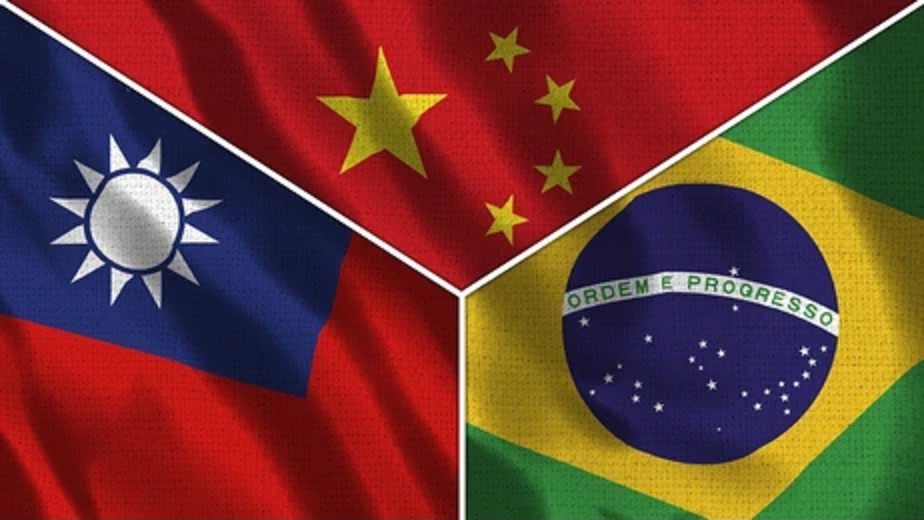While Brazil feels the impacts of the invasion of Ukraine by Russia, a new geopolitical conflict may affect even more the Brazilian economy: the crisis between China and Taiwan, after the visit of the president of the United States House of Representatives, Nancy Pelosi, to Taiwan shakes Asia.
Figures from the Ministry of Industry, Foreign Trade, and Services (Mdic) show that Taiwan is the 42nd country that buys the most from Brazil: US$1.3 billion in 2021 alone and US$804 million between January and July this year.
On the other hand, China is the elephant in the room: Brazil had a US$40.2 billion surplus with Beijing last year, the leading Brazilian trade relationship worldwide.

To understand the consequences, O TEMPO’s reportage talked with the Center for Brazil-China Studies coordinator at the Getúlio Vargas Foundation (FGV), Evandro Menezes de Carvalho, and a specialist in International Law, Emerson Malheiro.
As for Taiwan, Mdic data show that 67% of the island’s demand for Brazilian products comes from grains.
“The concern is not so much Taiwan. But losing any buyers for Brazil impacts our international trade. Even more, when it is a buyer of grains of our agribusiness, it plays an important role in our trade balance. But it is also important to remember that any conflict involving China is dramatic for our economy,” says the FGV specialist.
The lawyer specializing in International Law, Emerson Malheiro, agrees with his colleague. “There is a considerable economic impact for Brazil because logistics gets complicated. China’s military vessels are sailing in the Taiwan Sea, making it difficult for commercial ships to leave to deliver products to other countries,” he says.
In 2021, Brazil imported US$2.7 billion in products from Taiwan, meaning the trade balance is in deficit by R$1.3 billion. In practice, Brazil buys twice as much as it sells to the island.
The main Brazilian demand is for thermionic valves, equipment used, above all, in the industry of musical instruments for building sound boxes: 41% of purchases are from the sector. But there is also relevance in telecommunications equipment (5%), the manufacturing industry (4.9%), and data processing machines (4.4%).
Taiwan aside, the greatest concern of Evandro Menezes de Carvalho, from FGV, is the reflexes of the tension in the Brazil-China trade balance.
Like Taiwan, about 40% of Brazilian sales to Beijing came from soybeans, but there is also great relevance of iron ore (20%), oil (16%), and beef (8.1%).
On the other hand, Brazil imports a wide variety of products from the Asian giant, such as fertilizers, electrical appliances, insecticides, thermionic valves, and medicines, without dominating a specific sector.
“So I think it’s not just a Taiwanese issue, nor is it such a relevant country. But, the most relevant of all is China. So we should worry that any conflict involving China is harmful to Brazilian interests,” says Carvalho.
He recalls that the relationship between the countries is of “low profile,” especially after the Chinese ambassador to Brazil left the Latin country after public disagreements with President Jair Bolsonaro (Liberal Party – PL).
“Brazil has an excellent trade relationship with China, however a relationship that is still low profile today. The possibilities for cooperation with China are innumerable, but they are being little explored in this government, to the point that China doesn’t even have an ambassador here in Brazil.
“The ambassador it had before returned to China a few months ago. Now, there is a chargé d’affaires, which shows that the relationship in the business, commercial, and partnership area with Brazil is a little lukewarm, and a conflict with China could shake things up a little more”, affirms Evandro Menezes de Carvalho, coordinator of the FGV’s Brazil-China Study Center.
SHOULD BRAZIL POSITION ITSELF IN THE CONFLICT?
Given the tension in Asia provoked by the USA, the question remains: should Brazil publicly position itself on one side or the other, as President Bolsonaro did in the war between Russia and Ukraine when he visited Putin weeks before the beginning of the conflict in Eastern Europe? For the specialists interviewed by the report, the most indicated path is neutrality.
Evandro Menezes de Carvalho, from FGV, remembers that Brazil recognized the People’s Republic of China in 1974, during the military dictatorship. According to him, there has never been tension between Beijing and Taiwan since the civil war between the Nationalists and the Communists ended in 1949.
The coordinator explains that there is no struggle over recognizing the island as an independent country but whether communists or nationalists rule China.
“This is the result of the principle that there is only one China, a principle that was reiterated in 1992 by both the Communist Party of China and the Nationalist Party. As we know, the present government is not of the Nationalist Party. It is of the progressive democratic party, which, therefore, does not have this commitment (to validate the 1992 agreement)”, he says.
Since Brazil recognized that the Communists ruled China in 1974, the ideal is to reaffirm this commitment now, according to Carvalho.
“I would say that Brazil should not, at this moment, get involved in this. Even for Brazilian interests, it is better if China remains unified and stable. The more China remains unified, and its economic movements continue, the better for Brazilian interests,” he adds.
The lawyer specializing in International Law, Emerson Malheiro, follows the same line. “If Brazil supports China, it may be considered an antidemocratic country. On the other hand, if it supports Taiwan, it may receive severe retaliations from China. So, to remain an observer is the best thing to do,” he affirms.
With information from O Tempo

